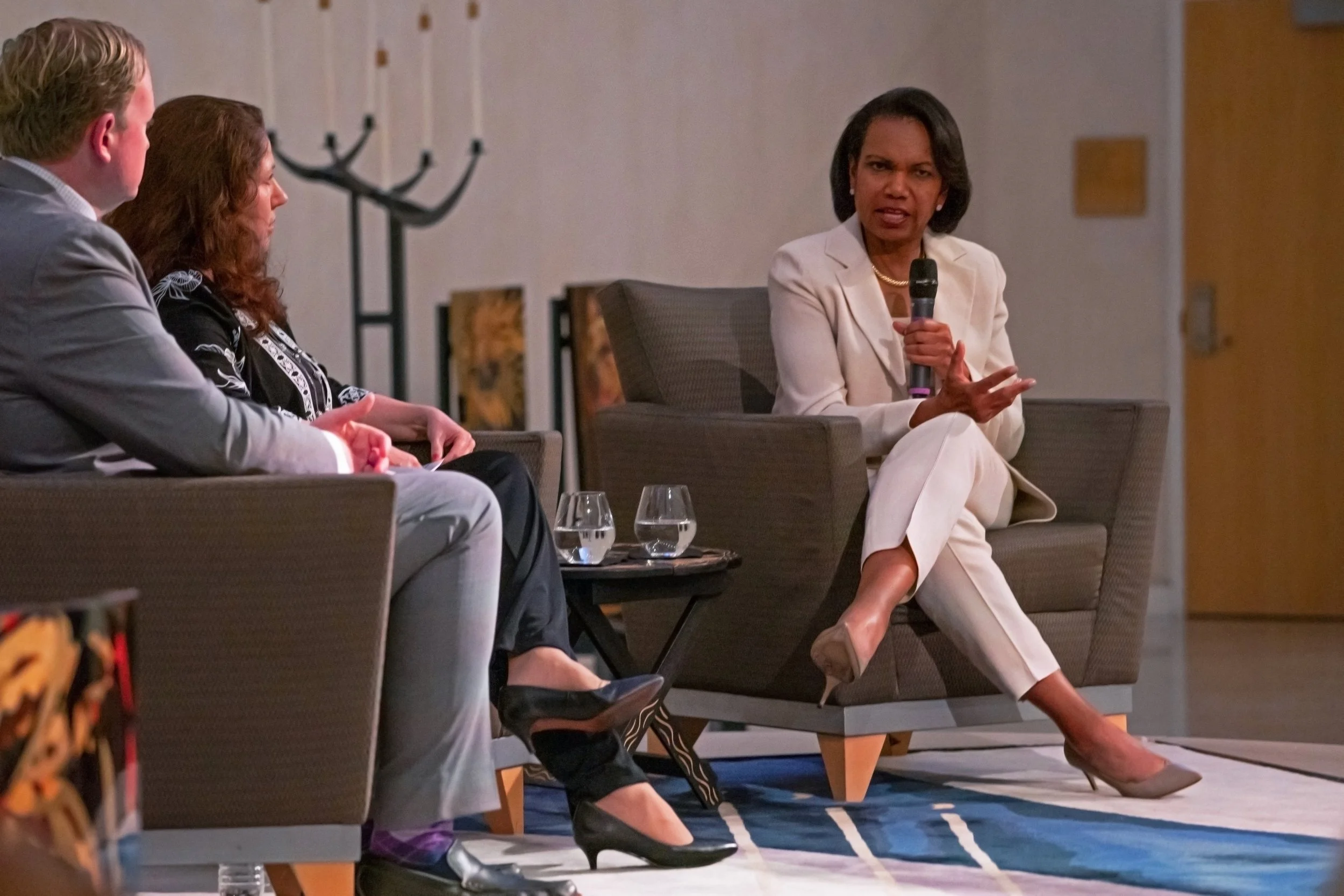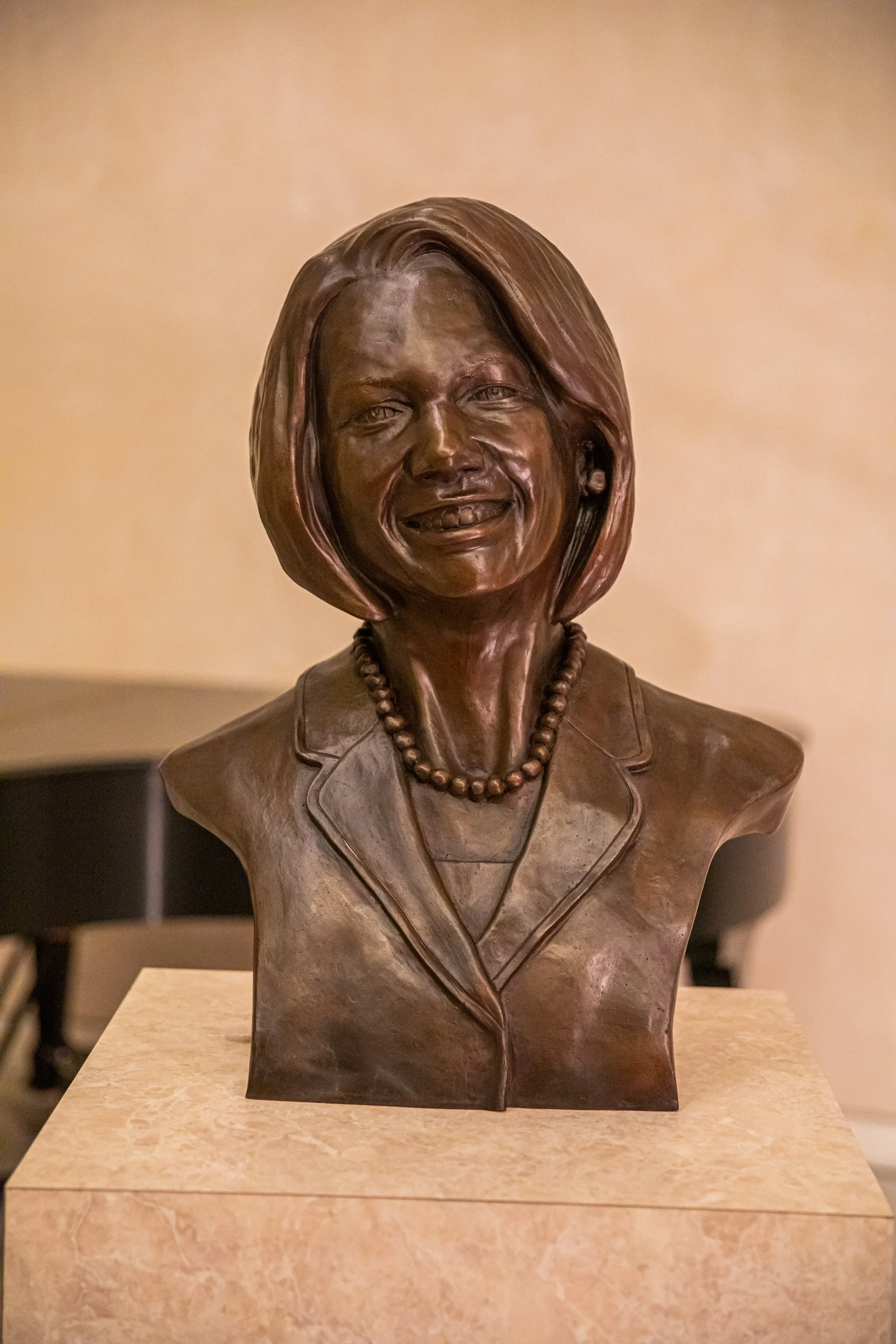Former U.S. Secretary of State Condoleezza Rice celebrates Chapman presidential studies
Rice was invited to speak on April 26 to students and community members as a part of the university’s presidential studies program at the Fish Interfaith Center. Photo by DANIEL PEARSON, staff photographer
After losing an elementary school classmate in the Baptist Street Church Bombing on Sept. 15, 1963 — a time when the Civil Rights Movement was at its peak — former U.S. Secretary of State Condoleezza Rice knew that she needed to foster change in the nation.
By becoming the second woman and first Black woman to hold the position of U.S. Secretary of State, she did just that.
Although Rice had not always known that she wanted to be a politician, initially dreaming of becoming a concert pianist in her youth, her experiences in a racially segregated Alabama, as well as her International Studies Ph.D. from the University of Denver, led her to a career in politics.
“Having been through that imperfect America, I was a better representative for this America,” Rice said at an April 26 event at Chapman University.
Rice was invited to speak to students and community members as a part of Chapman’s presidential studies program, established in 2021 by two endowed chairs, at the university’s Fish Interfaith Center.
She recalled her youth growing up in Birmingham, Alabama — which she said was nicknamed “Bombingham” due to the number of bombings in the area in the 50s and 60s — and finding her passion for politics and international relations as a Black woman. She also discussed civic engagement, challenges facing the U.S. today and her experience serving as the secretary of state under former President George W. Bush.
Lori Cox Han, the director of the presidential studies program, said the event was meant to serve as a kick-off for the future of presidential studies at Chapman.
“The program has been around for a year and a half, but we haven’t had the chance to do a big event like this,” Han told The Panther in a phone interview before the event. “This is an opportunity to bring a lot of Chapman supporters, friends, donors and VIPs to dinner and highlight what we want to do in the program.”
Chapman President Daniele Struppa also unveiled a commemorative bust of Rice that will be placed on campus and added to the university’s preexisting collection. Photo courtesy of Chapman University
Chapman President Daniele Struppa also unveiled a commemorative bust of Rice that will be placed on campus and added to the university’s preexisting collection.
There were two events that Rice participated in on April 26. At 6 p.m., Rice spoke to 19 Chapman students who were chosen by Han and Luke Nichter, both endowed chairs in presidential studies. These students were able to personally ask Rice questions at the event.
One of these students was Robert Julian Tuttle, a senior film production major.
“I felt honored to have the chance to meet a woman who has served our country in one of the most influential positions you can have in the world,” Tuttle said. “I don’t think it was possible for anyone to leave that event not feeling more honored in one’s country… Dr. Rice unknowingly left a new sense of patriotism in me, of not just honor, but of duty as well.”
The Panther was not invited to attend the 6 p.m. event. At 7:30 p.m., Rice spoke at a second event to the students, as well as donors, faculty, administrators and other guests. The Panther was invited to attend this event, moderated by Han and Nichter.
From her initial years in Alabama to her first-hand accounts of the 9/11 tragedy and biggest concerns for U.S. politics today, here are some key ideas presented by the former secretary at the event.
What are the largest concerns facing the U.S. today?
When asked about the largest concerns facing the country, Rice mentioned that the biggest issue is not the rise in artificial intelligence (AI) technologies or foreign policy, but the U.S. itself.
For Rice, she has seen a great decline in civil society — the fabric of organizations that define citizen interests such as churches and religious groups — in the U.S. over the years. Rice also noted a decline in confidence in democratic institutions: in other words, a decline in the everyday values and ethics within a society.
In general, Rice has seen a growing belief from citizens that the U.S. is in a state of tyranny through its growing distrust in federalism.
According to Rice at the panel, these declinations have likely been a product of unhealthy civil discourse in the nation, noting that when it comes to political disagreement, citizens today “don’t know each other very well anymore.”
“It is not career-enhancing to be the angriest (in the room),” Rice said.
When asked about the deepening political divide in the U.S., Rice mentioned that the rise of biased media and channels of communication have left citizens closed-minded.
“You actually don’t have a constitutional right to not be offended,” Rice said. “Don’t be a prisoner of the echo chamber… Democracy is at its strongest when citizens take care of citizens.”
In regards to other concerns facing the U.S. presently, Rice listed the concerns of growing AI technologies, like ChatGPT, as well as concerns with great power rivalries — such as the rise in the military and economic power of China and Russia.
Rice also noted concerns regarding the U.S. presidency. According to Rice, a “consensus” in the constitution for a new president to honor their former’s executive orders was disrupted when Donald Trump was elected in 2016 and undid the executive orders enacted by Barack Obama before him. Rice also mentioned that the executive branch has had more sway than usual on their populus in recent years, such as Trump’s ability to incite insurrection in 2020.
“The executive branch is weakening other institutions,” Rice said.
What can be done to solve these problems?
For Rice, the concerns regarding the current state of the U.S. could be resolved by what she said to be a revitalization of the “American Dream” and what democracy was intended to be. Rice said this could look like more democratic involvement from citizens, such as more grassroots initiatives, more participation in an ethical civil society and more healthy discourse among citizens, instead of “angry” conversations.
Rice also envisions a recapture of domestic stability, more educational freedom and a decrease in college debt.
According to Rice at the panel, it is important for people to be open to listening to others with opposing political and social viewpoints. Each morning, the former secretary said she reads a piece of writing from a perspective she may disagree with.
“I read one column every morning that is going to put me on edge,” Rice said.
Rice emphasized that there is a deep need for patience in the pursuit of rights as well, noting that when she experienced racial antagonism in Alabama, it was not an easy process to work toward democratic peace, just as it won’t be an easy process to mend the political divide in today’s America.
“Democracy is a very long process,” Rice said. “It’s a journey, not a destination. It must be built brick by brick.”
Rice’s reflections and memories from 9/11
Rice was the national security advisor on Sept. 11, 2001. During the panel event, she recalled that day, as she was in the White House when the planes struck the World Trade Center.
According to Rice, she was evacuated into the bunker under the White House by the secret service throughout the day. That night, White House staff were evacuated to the bunker once more, and she recalled seeing George W. Bush in gym shorts, Laura Bush in bunny slippers and their dogs running around after they were all woken up in the middle of the night.
She joked about how the president pulled out a “sofa bed that had not been opened since the Cuban missile crisis” and declared he was going to sleep.
9/11 led to efforts toward the war on terror, which included the Bush Doctrine: multiple interrelated foreign policy principles created by the Bush Administration that Rice helped to produce.
Emma Charles, a junior double majoring in broadcast journalism and documentary and political science, told The Panther she was fortunate to meet Rice and attend the private Q&A with her.
“I learned a lot from her perspective on the Ukraine war to hearing about being a national security advisor during 9/11,” Charles said. “My biggest takeaway from the event was that Dr. Rice made an excellent point that we have to be able to listen to different perspectives and people we do not agree with in order to work together and have democracy.”
Han said that moving forward, the goal is to expand the presidential studies program, invite more speakers and encourage a sense of civic engagement and civil discourse on Chapman’s campus and surrounding areas.
“It’s a great opportunity for our students to get to ask questions, be in a room with her and hear her thoughts on foreign policy and leadership and all the things — in terms of political science and the presidency — that we want our students to think about and have exposure to,” Han told The Panther.


